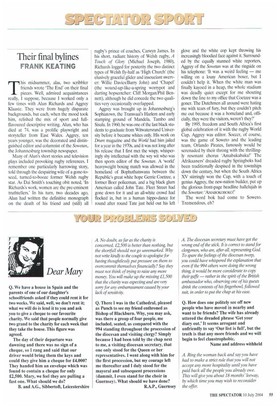Their final bylines
FRANK KEATING
This midsummer, alas, two scribbler friends wrote The End' on their final pieces. Well, admired acquaintances really, I suppose, because I worked only a few times with Alun Richards and Aggrey Klaaste. They were from hugely disparate backgrounds, but each, when the mood took him, relished the mix of sport and fullflavoured descriptive writing. Alun, who has died at 74, was a prolific playwright and storyteller from East Wales. Aggrey, ten years younger, was the decorated and distinguished editor and columnist of the Sowetan, the Johannesburg township newspaper.
Many of Alun's short stories and television plays included provoking rugby references. I remember one particularly harrowing story, told through the despairing wife of a gone-toseed, turned-to-booze former Welsh rugby star. As Dai Smith's touching obit noted, 'In Richards's work, women are the pre-eminent truthtellers.' In his turn, two decades ago, Alun had written the definitive monograph on the death of his friend and (still) all rugby's prince of coaches, Caiwyn James. In his short, radiant history of Welsh rugby, A Touch of Glory (Michael Joseph, 1980), Richards logged for posterity the two distinct types of Welsh fly-half as 'High Church' (the elusively graceful glider and insouciant swerver: Willie Davies/Barry John) and 'Chapel' (the wound-up-like-a-spring worrypot and darting hopscotcher: Cliff Morgan/Phil Bennett), although he did concede the two qualities very occasionally overlapped.
Aggrey was brought up in Johannesburg's Sophiatown, the Transvaal's Harlem and early stamping ground of Mandela, Tambo and Sisulu. In 1960, he was one of the last black students to graduate from Witwatersrand University before it became whites only. His work on Drum magazine and the World had him jailed for a year in the 1970s, and it was not long after his release that I first met the wispy, whisperingly shy intellectual with the wry wit who was then sports editor of the Sowetan. A 'world' heavyweight boxing match was allowed in the homeland of Bophuthatswana between the Republic's great white hope Gerrie Coetzee, a former Boer policeman, and a big black glum American called John Tate. Fleet Street had gone down for it and an all-white crowd had flocked in, but in a human hippo-dance for round after round Tate just held out his left glove and the white cop kept throwing his increasingly bloodied face against it. Surrounded by the equally stunned white reporters, Aggrey of the Sowetan was at the ringside on his telephone: 'It was a weird feeling — me willing on a lousy American boxer, but I couldn't help it. When the white man was finally kayoed in a heap, the whole stadium was deadly quiet except for me shouting down the line to my office that Coetzee was a goner. The Dutchmen all around were hating me with tears of fury, but they couldn't pitch me out because it was a homeland and, officially, they were the visitors, weren't they?'
By 1995, freedom and South Africa's first global celebration of it with the rugby World Cup, Aggrey was editor. Soccer, of course, was the game of Soweto and the leading team, Orlando Pirates, famously would be serenaded by their throng with the thrillingly resonant chorus `Amabakabaka !' The Afrikaaners' dreaded rugby Springboks had been traditionally despised in the townships down the century, but when the South Africa XV stirringly won the Cup, with a touch of genius Aggrey, the new-nation builder, put up the glorious front-page headline hallelujah in the Sowetan: AMABOKOBOKOr The word bok had come to Soweto. Tremendous, eh?


























































 Previous page
Previous page